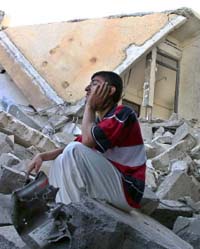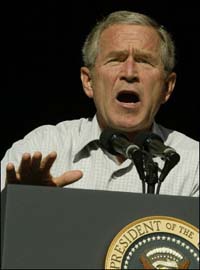|
Elections Behind US Escalation in Iraq: Report
 |
|
The US escalation in Iraq adds to the already simmering resentment among Iraqis (AFP)
|
By
Abdul Raheem Ali, IOL Correspondent
CAIRO,
September 15 (IslamOnline.net) – The US-led occupation forces have
escalated attacks in Iraq mainly to serve elections in the United
States and Iraq as well as to face sophisticated tactics of resistance
in the oil-rich country, experts believe.
Hundreds
of Iraqis, including women and children, were killed in land and air
raids by the US
forces on many residential areas on claims they are supporting
resistance fighters in the occupied country.
“With
four months to go before nationwide elections in Iraq, the resistance
operations have grown more sophisticated using street war tactics –
much to leave American soldiers shivering of shock,” said Hussein
Ouaydat, a Syrian political analyst.
“This
pushed the US
military to make a quick aggressive intervention to raise the almost
collapsing morale of its soldiers,” Ouaydat told IslamOnline.net by
telephone.
Resistance
fighters’ attacks have grown more brazen and sophisticated,
“prompting American commanders to begin a series of military
operations to regain control over large sections of the country lost
in recent months,” the New York Times has reported Monday, September
13.
The
report came one day after the Iraqi fighters struck the Americans and
their allies in the Iraqi government in manifold ways: with bombings,
mortars and rockets.
Alliance
Fears
are also growing after the
US
forces discovered attempts by some political forces opposed to
occupation and the US-backed interim government in
Iraq
to ally with armed resistance to get more organized within a political
context, Ouaydat said.
In
August 2004, representatives of Sunni resistance groups and
anti-occupation Iraqi political forces met in Beirut
for seeking an alternative National Conference challenging the one
held by the Iraqi government and backed by Washington.
To
add salt to injury, the Iraqi government does not enjoy high
popularity in the country, something which makes it a danger to keep
pockets of resistance working in the country.
“The
main reason for the
US
occupation forces to escalate military operations in
Iraq
is the approaching elections in the country,” said Wahid
Abdel-Majid, the deputy director of Al-Ahram Center
for Political and Strategic Studies.
Iraqi
Prime Minister Iyad Allawi said last week that the
US
operations are targeting "pockets of resistance", and that
they came "at the request of my government."
American
Elections
 |
|
Bush’s election campaign is to benefit from the escalating attacks in Iraq
|
Analysts
also believe that the escalating attacks in
Iraq
do serve
US
President George W. Bush’s chances for securing a second term in the
White House.
“Bush
wants to prove to his voters his ability to crush down terrorism –-
a matter which has a high priority on his agenda of the re-election
campaign," said Gamal Zahran, a lecturer in
Suez canal
.
The
democratic presidential competitor John Kerry has heaped criticism
over Bush for a rising casualty toll among US soldiers and a continued
cauldron of chaos and anarchy in
Iraq
.
UN
Support
Observers
believe that any delay of the Iraqi elections and continued violence
in Iraq
would cast a pall on Washington’s bids to legalize its military presence in the oil-rich country
– so far deemed an occupation even by the United Nations – and
draw more support from world countries.
Iraq
has the world’s second largest reserves of oil – whose prices are
expected to shore up as far as 50 dollars a barrel this winter.
US
Ambassador John Danforth on September 14, urged nations to contribute
troops and money to provide security so the United Nations can return
to
Iraq
, especially to help with upcoming elections.
“Everybody
who cares about
Iraq
believes the election should be held and the election should be held
on schedule,” Danforth said.
“The
UN's presence is very important.”
But
he admitted that the security situation in
Iraq
remains fragile, “attacks are persistent, and lives continue to be
lost.
At
the heart of the problem facing Allawi and the American occupation
forces is the legitimacy of the January elections.
Iraq
's new deputy UN ambassador, Feisal Amin Al-Istrabadi, urged Tuesday
the world's nations to send troops to protect an expanded UN staff
which he called essential for holding the country's first free
elections.
The
Security Council has directed the United Nations to play a leading
role in helping
Iraq
hold elections and establish a battalion for the multinational force
that would provide security for UN personnel and offices.
But
because of the high level of instability, the United Nations has
established its main office outside
Iraq
and has been unable to send in more than a few dozen international
staff on an ad hoc basis.
Backfire
But
the
US
newly aggressive strategy in
Iraq
put the world’s sole superpower in a dilemma.
The
Americans are rapidly finding themselves in the classic dilemma faced
by governments battling guerrilla movements: ease up, and the
resistance may grow; crack down, and risk losing the support of the
population, said the NY Times Tuesday.
The
additional quandary facing the Americans is the need to break the
deadlock before January, the self-imposed deadline for elections, it
added.
“When
the Americans fire back, they don't hit the people who are attacking
them, only the civilians,” Osama Ali, a 24-year-old Iraqi who
witnessed one US attack, told the daily.
“This
is why Iraqis hate the Americans so much. This is why we love
resistance fighters.”
Also,
an iron fist also the risk of alienating allies. On Monday,
Turkey
's foreign minister, Abdullah Gul, said his government would end all
cooperation with the
United States
in
Iraq
if the military did not stop pounding Talafar, a northern city of
ethnic Turkmen where 50 were killed over the last two days.
|